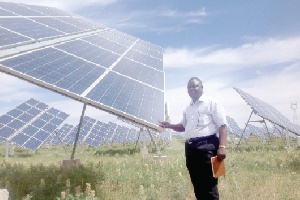Saddled with energy generating problems, Ghana has long explored the potential of renewable energy (RE) as an alternative for producing power in both domestic and industrial requirements.
Ghana wants to increase its energy generation from renewables to 10 percent in 2020, and the country’s policy space for renewable energy is underpinned by the Renewable Energy Act (ACT 832), which mandates the Energy Commission to register all renewable energy service providers operating in Ghana.
Since 2002, the German Federal Ministry of Economics and Energy has been supporting the global dissemination and the transfer of technologies for renewable energy under ‘renewables-Made in Germany’, which is implemented by GIZ.
GIZ has been implementing the Project Development Programme (PDP) sub-Saharan Africa within the framework ‘renewables-Made in Germany’ initiative since 2012. German companies have gained broad experience in developing renewable energy technologies and they offer viable products and services adapted to sub-Saharan Africa.
It is within this framework that GIZ and the Delegation of German Industry and Commerce in Ghana (AHK) recently organised a two-day seminar for banks and development financial institutions in the country on financing renewable energy projects from the Net-metering to Utility-scale.
The presentation was led by Silvia Kreibiehl, Head of the Frankfurt School-United Nations Environment Programme (UNEP) Collaboration Centre for Climate and Sustainable Energy Finance, who observed that a huge potential exists in the country to develop renewable energy.
Therefore, Ms Kreibiehl believes that commercial banks and development financial institutions can tap into this niche and expand their product range to include financing renewable energy, in line with the growing ‘green economy’ culture that promotes sustainable use of resources.
Renewable energy for electricity is expected to come mainly from solar, small- and medium-scale hydro plants, wind, biomass and solid waste.
She noted that power generation from an increasing number of renewable energy sources is cost competitive to traditional fossil-fuel sources. “While climate change mitigation remains an important driver of RE deployment, the business case for RE itself becomes more and more attractive,” she stated.
Kreibiehl said regulatory intervention or long-term contracts (PPAs) will remain necessary to compensate investors for high capital intensity. “Long-term financing is required to scale-up RE deployment,” she added.
She told the participants that RE-generation projects need to be carefully analysed in particular with regard to grid integration aspects to make them bankable.
Participants were taken through environmental economics, financing RE-risk assessment and project finance-global volumes, and financing structures among others. She informed participants that the Equator Principles provide good guidance on how to analyse environmental and social risk.
The Risk Management framework has been adopted by, currently, 80 financial institutions in 34 countries for determining, assessing and managing environmental and social risk in projects. It provides a minimum standard for due diligence to support responsible risk decision-making.
Business News of Thursday, 2 October 2014
Source: B&FT
Banks schooled on financing renewables
Entertainment












